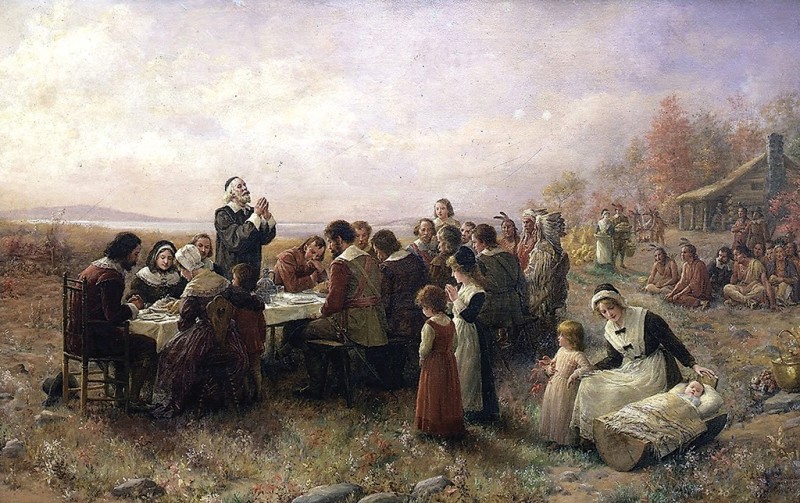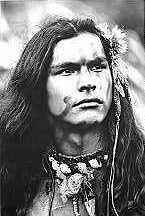 Another Stereotype of the Month entry:
Another Stereotype of the Month entry:
 Another Stereotype of the Month entry:
Another Stereotype of the Month entry:
From the NY Times, 11/24/05:
Op-Ed Columnist
The Real Thanksgiving
By DAVID BROOKS
And so in the year of our Lord 1620, the Pilgrims did depart from all kith and kin in the town of Leiden and ventured forth across the ocean to seek a new Jerusalem and a new Eden.
The voyage was hard and long, for the Pilgrims could find passage only on The Nation magazine's summer cruise and Gore Vidal hogged the Jacuzzi. Yet onward they ventured, across the vastness of the ocean until finally the infinite wonder of the New World came into view, and the passengers of the Mayflower realized here they could raise their children and their children's children to be snooty and the subjects of John Cheever stories.
They were greeted at the shore by a tribe of native peoples, led by chief Massasoit and his lobbyist Abramoff. The Pilgrim leader William Bradford spoke first: "Behold! We have come to drive you from your land and fill it with sexually frigid white people!"
And it came to pass that Massasoit was relieved by this declaration, for at least the strangers had not come promising to spread democracy. In exchange, all he asked was that he and his people be allowed to open casinos where David Brenner's career would never end and where Celine Dion would play Saturday nights.
Being thus arrived in a good harbor and brought to a safe land, the Pilgrims did proceed to build a shining city on a hill, though it made their legs tired and the driveway was hard to shovel in the wintertime. Declaring themselves the first Americans, they set out to become mortgage brokers and conference facilitators, and each began refinancing with the other.
But the Lord did not smile upon their endeavors, and by midwinter the food had run short and there was starvation across the congregation, especially for those on low-corn diets. The Pilgrims found they did not have enough to eat, and even when there was food, they couldn't get seated at a good table.
But what was most sad and lamentable was that in two or three months' time, half the company had died, Internet service was slow, and the Lord's favorability ratings began to decline. In the midst of these hardships, many did find spiritual succor by returning their attention to the Holy Book (even though parts of it were now behind a firewall as part of ScriptureSelect).
Others reacted to these difficult beginnings with murmurings of mutiny and discontent. It was said that Miles Standish had brought the flock to the New World on the basis of faulty intelligence, while others claimed the pilgrimage had been ruined by the religious right.
But as winter turned into spring, the forests came alive with animals and meat. There were deer in plenitude, as well as geese and turkeys, all of it free range. The ponds and rivers yielded forth clams, oysters and other trayf, and the mischievous little cabernet they had brought from Europe was finally ready to uncork. And so a great feast of Thanksgiving was announced (dress code: frilly but puritanical). The great Indian chief Massasoit, who was by this time really into kabbalah, brought 90 warriors to the feast, each bearing scented candles and dim sum.
As it turned out, the first Thanksgiving was a little anticlimactic because it followed five days after the first bat mitzvah, with guest singers Ashanti, Ja Rule and the Backstreet Boys. Nonetheless, there was great merriment amongst the gathering, as well as several surprise winners of the Pilgrims' Choice Awards.
The dinner was delicious, no matter what some people wrote later in Zagat, and after the football game, Miles Standish brought forth Jonathan Edwards, Puritanism's leading motivational speaker, who energized the crowd with his famous talk, "Cower Before God's Wrath, Ye Slimy Pusballs of Sin!"
And Governor Bradford reminded his flock that all honorable actions are accompanied with great difficulties, which must be overcome with answerable courages, and all ignored him because "CSI: Salem" was on. But all Americans owe much to those brave folk who supped that day.
For it is from those Pilgrims, the last WASP's to truly look good in black, that we have inherited the essential elements of the American character -- our ability to look honestly at ourselves and find other people less intelligent; our ability to endure moments of amazing hardship before resorting to litigation; our ability to build this nation, so broad and strong, which the Chinese will one day be proud to own.

Rob's comment
Even in a satire, Brooks is stereotyping Indians and their role in the first Thanksgiving:
In reality, the food didn't just appear. The Indians brought it and thus saved the Pilgrims. America was founded because Massasoit's people facilitated it, not God.
The Thanksgiving painting kind of says it all. In it the Pilgrims thank God, not the Indians who saved them. The Indians are relegated to a minor role—sitting at the end of the table or on the ground nearby. The Pilgrims' self-importance is self-evident. Although this is only painter Brownscombe's take on the scene, most Americans have learned to see it this way.
In short, Brooks's column is part of the myth-making process, even as it pretends to make fun of the myth. Which isn't surprising if you know Brooks is a conservative columnist. In general, his columns are about upholding the status quo: the Anglo-American power structure, with its perks and privileges.
Related links
Ten little Pilgrims and Indians
Tonto and the "good Indian"
|
. . . |

|
All material © copyright its original owners, except where noted.
Original text and pictures © copyright 2007 by Robert Schmidt.
Copyrighted material is posted under the Fair Use provision of the Copyright Act,
which allows copying for nonprofit educational uses including criticism and commentary.
Comments sent to the publisher become the property of Blue Corn Comics
and may be used in other postings without permission.